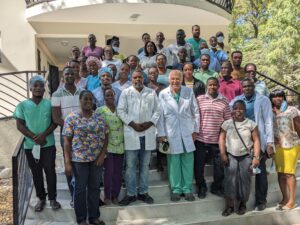
Author Archives: Rozanne Prather
Medical Care: A Tale of Two Countries

Some of our dedicated staff of Higgins Brothers Surgicenter for Hope gather with Dr. Ted Higgins (center with green scrubs/white coat) on the steps of the newly completed Shawn Warren Crowley Medical Pavilion in Fonds Parisien, Haiti.
By Ted Higgins, M.D.
Imagine infants transported on ventilators and refused admission until payment is received by the hospital. It happens in Haiti and, unfortunately, these are not isolated incidents.
While some would argue that no health system is perfect, the disparities in Haiti are further magnified when someone arrives at a hospital in need of care.
If an accident or emergency situation develops in the U.S., hospital emergency rooms are obligated to care for patients. The Emergency Medical Treatment and Labor Act (EMTALA) makes this possible so that emergency care is accessible for everyone regardless of ability to pay.
Patients needing emergency care are treated and often stabilized until further ambulance or helicopter medical transportation can be arranged to a larger medical facility. There are no bills to pay initially in order to receive life-saving care.
In Haiti, the situation is much different. There is no EMTALA law that necessitates care in hospitals. Often even initial emergency care is not given until some form of payment is provided.
Then, there’s the cost of care in relation to Haitian income – presently the lowest annual income in the western hemisphere, and the third lowest in the world. Any operations require the patients to not only pay the surgeon and anesthesia fee, but also the cost of the equipment utilized, the hospital, and medication fee as well. This can easily run into the thousands of dollars, and there is no insurance plan in Haiti to offset costs. The annual average yearly income is $520 for Haitians. This is why many patients die rather than undergo a life saving operation. Sometimes this can be as basic as a ruptured appendix. If untreated, sepsis and death can result which could have been avoided with a basic surgical procedure.
It is not an easy job caring for sick patients, particularly in this time of Covid. In the US, hospital nurses generally work 6, 8, or 12 hour shifts. When finished with their shift, they drive home, rest, and be with their families or friends. After a 12 hour shift there is generally a day or two of rest before the next shift begins.
In Haiti, nurses and doctors risk their lives to travel home after their shifts because the roads are controlled by threatening gangs. They risk kidnapping, robbery, injury, and even death. At Higgins Brothers Surgicenter for Hope, we’ve had an employee temporarily kidnapped as well as employees robbed and injured. Timing for travel is critical, as there are no back roads in Haiti, only mountains. As a result, many nurses and doctors work for a week or two at a time, remaining in the safe zone of the medical campus.
The risks are equally serious for our patients and their families. Many are unable to travel for necessary surgeries and, regrettably, often result in the patient’s death.
What remains remarkable is that our 24/7 emergency and trauma facility, the only one in the region, has remained open and functioning during all of 2021, and remains so in 2022.
Persevering the crisis in Haiti will continue to draw on the Haitian people’s courage, strength, and resilience. Our medical facilities and other clinics in the area are in need of medical supplies and equipment that cannot be delivered with dangerous gangs blocking the roads. On my most recent trip a few weeks ago, we traveled by way of the Dominican Republic rather than the usual Port Au Prince entry. This is a much longer but safer journey but not sustainable over the long haul.
As always, we must continue to support our team at Higgins Brothers Surgicenter for Hope in Fonds Parisien Haiti, and encourage them in their good and faithful work. As they remain united, determined, and dedicated to our mission, we will continue to provide every resource to ensure their safety and compassionate care to our patients. Your continued prayers and financial contributions are much needed and sincerely appreciated.